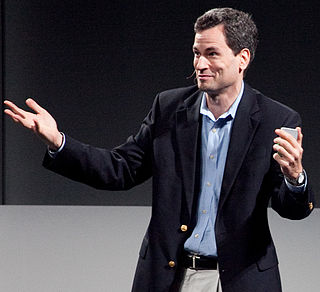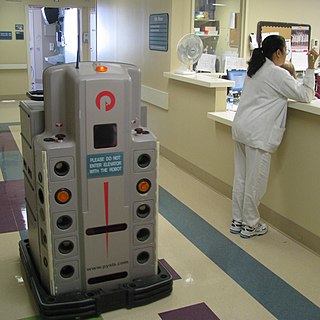Related Research Articles

William Nelson Joy is an American computer engineer and venture capitalist. He co-founded Sun Microsystems in 1982 along with Scott McNealy, Vinod Khosla, and Andy Bechtolsheim, and served as Chief Scientist and CTO at the company until 2003.

The Industrial Revolution, also known as the First Industrial Revolution, was a period of global transition of the human economy towards more widespread, efficient and stable manufacturing processes that succeeded the Agricultural Revolution, starting from Great Britain and spreading to continental Europe and the United States, that occurred during the period from around 1760 to about 1820–1840. This transition included going from hand production methods to machines; new chemical manufacturing and iron production processes; the increasing use of water power and steam power; the development of machine tools; and the rise of the mechanized factory system. Output greatly increased, and the result was an unprecedented rise in population and the rate of population growth. The textile industry was the first to use modern production methods, and textiles became the dominant industry in terms of employment, value of output, and capital invested.

The Luddites were members of a 19th-century movement of English textile workers which opposed the use of certain types of cost-saving machinery, and often destroyed the machines in clandestine raids. They protested against manufacturers who used machines in "a fraudulent and deceitful manner" to replace the skilled labour of workers and drive down wages by producing inferior goods. Members of the group referred to themselves as Luddites, self-described followers of "Ned Ludd", a legendary weaver whose name was used as a pseudonym in threatening letters to mill owners and government officials.
Anarcho-primitivism, also known as anti-civilization anarchism, is an anarchist critique of civilization that advocates a return to non-civilized ways of life through deindustrialization, abolition of the division of labor or specialization, abandonment of large-scale organization and all technology other than prehistoric technology and the dissolution of agriculture. Anarcho-primitivists critique the origins and alleged progress of the Industrial Revolution and industrial society. According to anarcho-primitivists, the shift from hunter-gatherer to agricultural subsistence during the Neolithic Revolution gave rise to coercion, social alienation, and social stratification.

Ned Ludd is the legendary person to whom the Luddites attributed the name of their movement.

Technophobia, also known as technofear, is the fear or dislike of, or discomfort with, advanced technology or complex devices, especially personal computers, smartphones, and tablet computers. Although there are numerous interpretations of technophobia, they become more complex as technology continues to evolve. The term is generally used in the sense of an irrational fear, but others contend fears are justified. It is the opposite of technophilia.

The Difference Engine (1990) is an alternative history novel by William Gibson and Bruce Sterling. It is widely regarded as a book that helped establish the genre conventions of steampunk.

George Franklin Gilder is an American investor, author, economist, and co-founder of the Discovery Institute. His 1981 book, Wealth and Poverty, advanced a case for supply-side economics and capitalism during the early months of the Reagan administration. He is the chairman of George Gilder Fund Management, LLC.
Neo-Luddism or new Luddism is a philosophy opposing many forms of modern technology. The term Luddite is generally used as a pejorative applied to people showing technophobic leanings. The name is based on the historical legacy of the English Luddites, who were active between 1811 and 1817. While the original Luddites were mostly concerned with the economic implications of improving technology in regards to industrialization, Neo-Luddites tend to have a broader and more holistic distrust of technological improvement.

The factory system is a method of manufacturing using machinery and division of labor. Because of the high capital cost of machinery and factory buildings, factories are typically privately owned by wealthy individuals or corporations who employ the operative labor. Use of machinery with the division of labor reduced the required skill-level of workers and also increased the output per worker.

David Welch Pogue is an American technology and science writer and TV presenter, and correspondent for CBS News Sunday Morning.

Low technology is simple technology, as opposed to high technology. In addition, low tech is related to the concept of mid-tech, that is a balance between low-tech and high-tech, which combines the efficiency and versatility of high tech with low tech's potential for autonomy and resilience.

Knights and Merchants: The Shattered Kingdom, known as simply Knights and Merchants, is a medieval-time based real-time strategy (RTS) video game. It was developed by Joymania Entertainment and published by TopWare Interactive in 1998. The player takes the role of the captain of the palace guards and leads the soldiers and citizens to victory. An expansion pack was released in 2001, titled Knights and Merchants: The Peasants Rebellion.

Kirkpatrick Sale is an American author who has written prolifically about political decentralism, environmentalism, luddism and technology. He has been described as having a "philosophy unified by decentralism" and as being "a leader of the Neo-Luddites," an "anti-globalization leftist," and "the theoretician for a new secessionist movement."
Criticism of technology is an analysis of adverse impacts of industrial and digital technologies. It is argued that, in all advanced industrial societies, technology becomes a means of domination, control, and exploitation, or more generally something which threatens the survival of humanity. Some of the technology opposed by the most radical critics may include everyday household products, such as refrigerators, computers, and medication. However, criticism of technology comes in many shades.

Roderigue Hortalez and Company was a corporation created by Luis de Unzaga as coordinator of interests of Spain and France in May of 1775 in order to provide arms and financial assistance to American Revolutionaries in anticipation of the American Revolutionary War against Britain. The ruse was organized by Pierre-Augustin Caron de Beaumarchais, a French playwright, watch-maker, inventor, musician, politician, fugitive, spy, publisher, arms-dealer, and revolutionary. Weapons and materials were procured to help the Americans fight the British, enemies of France at the time, through the corporation.

Technological unemployment is the loss of jobs caused by technological change. It is a key type of structural unemployment. Technological change typically includes the introduction of labour-saving "mechanical-muscle" machines or more efficient "mechanical-mind" processes (automation), and humans' role in these processes are minimized. Just as horses were gradually made obsolete as transport by the automobile and as labourer by the tractor, humans' jobs have also been affected throughout modern history. Historical examples include artisan weavers reduced to poverty after the introduction of mechanized looms. During World War II, Alan Turing's bombe machine compressed and decoded thousands of man-years worth of encrypted data in a matter of hours. A contemporary example of technological unemployment is the displacement of retail cashiers by self-service tills and cashierless stores.

"Fourth Industrial Revolution", "4IR", or "Industry 4.0" is a buzzword and neologism describing rapid technological advancement in the 21st century. The term was popularised in 2016 by Klaus Schwab, the World Economic Forum founder and executive chairman, who says that the changes show a significant shift in industrial capitalism.

Carl Benedikt Frey is a Swedish-German economist and economic historian. He is the Dieter Schwarz Associate Professor of AI & Work at the Oxford Internet Institute and a Fellow of Mansfield College, University of Oxford. He is also Director of the Future of Work Programme and Oxford Martin Citi Fellow at the Oxford Martin School.

Anti-Tech Revolution: Why and How is a 2016 non-fiction book by Ted Kaczynski.
References
- 1 2 3 "Brian Merchant to join The Times as technology columnist in Business". Los Angeles Times. January 20, 2023.
- ↑ Grossman, Lev (June 19, 2017). "The iPhone Is 10 Years Old. Here's the Story of Its Birth" – via NYTimes.com.
- ↑ "The One Device by Brian Merchant review – the secret history and moral cost of the iPhone | History books". The Guardian . amp.theguardian.com.
- ↑ Mueller, Gavin (September 21, 2023). "Workers' Movements or Tantrums Against Technology?" – via NYTimes.com.
- ↑ Blood in the Machine: The Origins of the Rebellion Against Big Tech, Brian Merchant. Little, Brown, $30 (496p) ISBN 978-0-316-48774-0 Publishers Weekly.
- ↑ Madrigal, Alexis (November 15, 2023). "Why Brian Merchant, a Tech Columnist, Says He's a Luddite | KQED". www.kqed.org.
- ↑ "Blood in the Machine: The Origins of the Rebellion Against Big Tech". www.ft.com.
- ↑ "BLOOD IN THE MACHINE | Kirkus Reviews" – via www.kirkusreviews.com.
- ↑ Gulliver, Katrina (September 29, 2023). "'Blood in the Machine' Review: Luddites Fighting the Future". Wall Street Journal . Retrieved February 28, 2024.
They saw the Industrial Revolution as a program to replace skilled craftsmen with machines, and rose up to defend the old ways.
- ↑ Affairs, Current (January 26, 2024). "Why You Should Be a Luddite" – via Current Affairs.
- ↑ Gulliver, Katrina (September 29, 2023). "'Blood in the Machine' Review: Luddites Fighting the Future". New Scientist .
They saw the Industrial Revolution as a program to replace skilled craftsmen with machines, and rose up to defend the old ways.
- ↑ Hancock, Jaime Rubio (January 9, 2024). "The Luddites defended their work against automation. What can we learn from them?". EL PAÍS English.